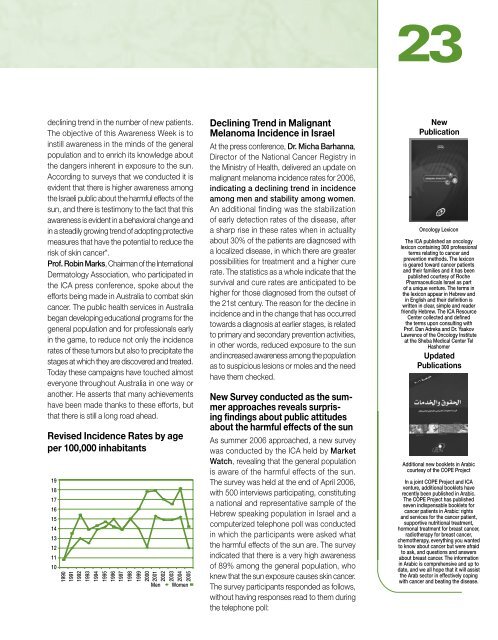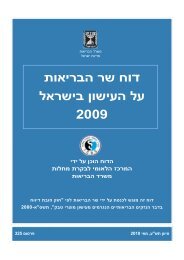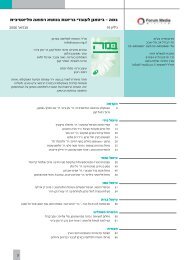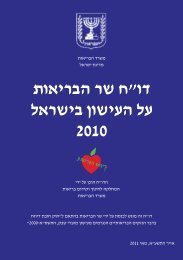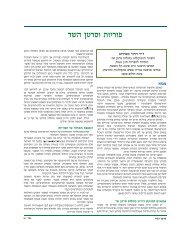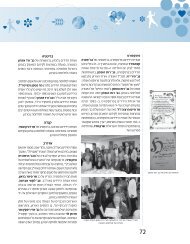Annual Report 2006
Annual Report 2006
Annual Report 2006
You also want an ePaper? Increase the reach of your titles
YUMPU automatically turns print PDFs into web optimized ePapers that Google loves.
23<br />
declining trend in the number of new patients.<br />
The objective of this Awareness Week is to<br />
instill awareness in the minds of the general<br />
population and to enrich its knowledge about<br />
the dangers inherent in exposure to the sun.<br />
According to surveys that we conducted it is<br />
evident that there is higher awareness among<br />
the Israeli public about the harmful effects of the<br />
sun, and there is testimony to the fact that this<br />
awareness is evident in a behavioral change and<br />
in a steadily growing trend of adopting protective<br />
measures that have the potential to reduce the<br />
risk of skin cancer".<br />
Prof. Robin Marks, Chairman of the International<br />
Dermatology Association, who participated in<br />
the ICA press conference, spoke about the<br />
efforts being made in Australia to combat skin<br />
cancer. The public health services in Australia<br />
began developing educational programs for the<br />
general population and for professionals early<br />
in the game, to reduce not only the incidence<br />
rates of these tumors but also to precipitate the<br />
stages at which they are discovered and treated.<br />
Today these campaigns have touched almost<br />
everyone throughout Australia in one way or<br />
another. He asserts that many achievements<br />
have been made thanks to these efforts, but<br />
that there is still a long road ahead.<br />
Revised Incidence Rates by age<br />
per 100,000 inhabitants<br />
19<br />
18<br />
17<br />
16<br />
15<br />
14<br />
13<br />
12<br />
11<br />
10<br />
1990<br />
1991<br />
1992<br />
1993<br />
1994<br />
1995<br />
1996<br />
1997<br />
1998<br />
1999<br />
2000<br />
2001<br />
2002<br />
2003<br />
2004<br />
Men<br />
2005<br />
Women<br />
Declining Trend in Malignant<br />
Melanoma Incidence in Israel<br />
At the press conference, Dr. Micha Barhanna,<br />
Director of the National Cancer Registry in<br />
the Ministry of Health, delivered an update on<br />
malignant melanoma incidence rates for <strong>2006</strong>,<br />
indicating a declining trend in incidence<br />
among men and stability among women.<br />
An additional finding was the stabilization<br />
of early detection rates of the disease, after<br />
a sharp rise in these rates when in actuality<br />
about 30% of the patients are diagnosed with<br />
a localized disease, in which there are greater<br />
possibilities for treatment and a higher cure<br />
rate. The statistics as a whole indicate that the<br />
survival and cure rates are anticipated to be<br />
higher for those diagnosed from the outset of<br />
the 21st century. The reason for the decline in<br />
incidence and in the change that has occurred<br />
towards a diagnosis at earlier stages, is related<br />
to primary and secondary prevention activities,<br />
in other words, reduced exposure to the sun<br />
and increased awareness among the population<br />
as to suspicious lesions or moles and the need<br />
have them checked.<br />
New Survey conducted as the summer<br />
approaches reveals surprising<br />
findings about public attitudes<br />
about the harmful effects of the sun<br />
As summer <strong>2006</strong> approached, a new survey<br />
was conducted by the ICA held by Market<br />
Watch, revealing that the general population<br />
is aware of the harmful effects of the sun.<br />
The survey was held at the end of April <strong>2006</strong>,<br />
with 500 interviews participating, constituting<br />
a national and representative sample of the<br />
Hebrew speaking population in Israel and a<br />
computerized telephone poll was conducted<br />
in which the participants were asked what<br />
the harmful effects of the sun are. The survey<br />
indicated that there is a very high awareness<br />
of 89% among the general population, who<br />
knew that the sun exposure causes skin cancer.<br />
The survey participants responded as follows,<br />
without having responses read to them during<br />
the telephone poll:<br />
New<br />
Publication<br />
Oncology Lexicon<br />
The ICA published an oncology<br />
lexicon containing 300 professional<br />
terms relating to cancer and<br />
prevention methods. The lexicon<br />
is geared toward cancer patients<br />
and their families and it has been<br />
published courtesy of Roche<br />
Pharmaceuticals Israel as part<br />
of a unique venture. The terms in<br />
the lexicon appear in Hebrew and<br />
in English and their definition is<br />
written in clear, simple and reader<br />
friendly Hebrew. The ICA Resource<br />
Center collected and defined<br />
the terms upon consulting with<br />
Prof. Dan Adreka and Dr. Yaakov<br />
Lawrence of the Oncology Institute<br />
at the Sheba Medical Center Tel<br />
Hashomer<br />
Updated<br />
Publications<br />
Additional new booklets in Arabic<br />
courtesy of the COPE Project<br />
In a joint COPE Project and ICA<br />
venture, additional booklets have<br />
recently been published in Arabic.<br />
The COPE Project has published<br />
seven indispensable booklets for<br />
cancer patients in Arabic: rights<br />
and services for the cancer patient,<br />
supportive nutritional treatment,<br />
hormonal treatment for breast cancer,<br />
radiotherapy for breast cancer,<br />
chemotherapy, everything you wanted<br />
to know about cancer but were afraid<br />
to ask, and questions and answers<br />
about breast cancer. The information<br />
in Arabic is comprehensive and up to<br />
date, and we all hope that it will assist<br />
the Arab sector in effectively coping<br />
with cancer and beating the disease.


